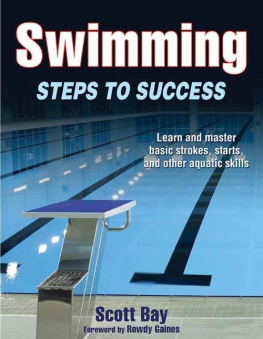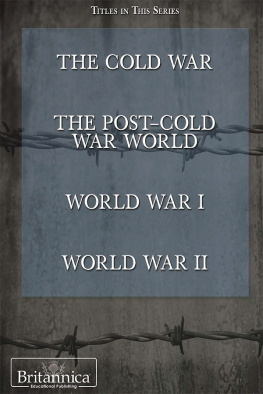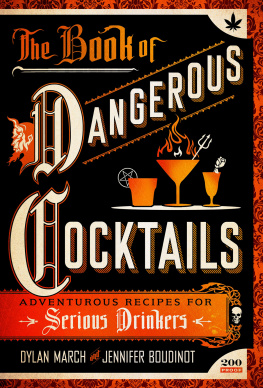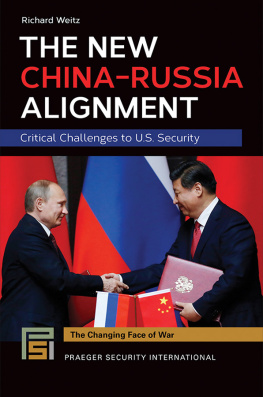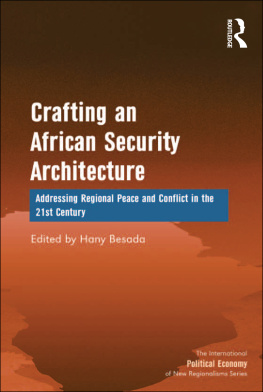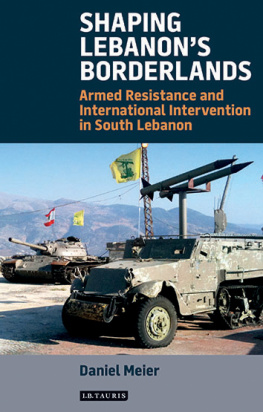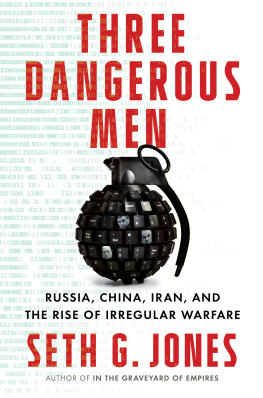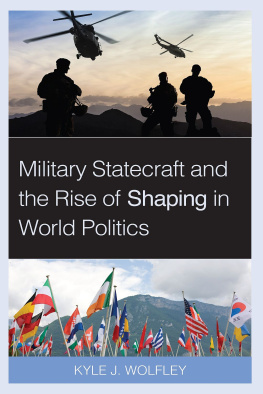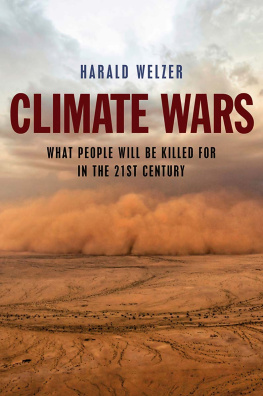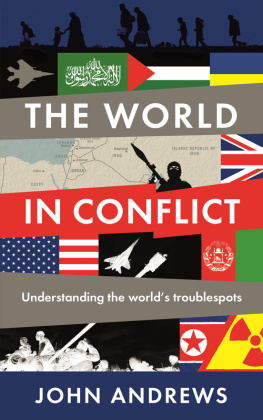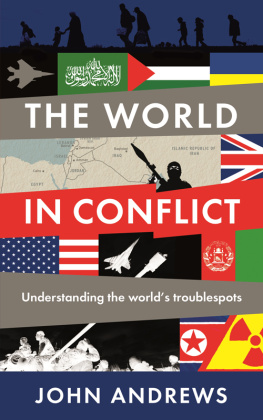COCKTAILS FROM HELL
Also by Col. Austin Bay
Embrace the Suck
A Quick and Dirty Guide to War
From Shield to Storm
Ataturk: The Greatest General of the Ottoman Empire
Coyote Cried Twice
Prism
The Wrong Side of Brightness

A BOMBARDIER BOOKS BOOK
An Imprint of Post Hill Press
Cocktails from Hell:
Five Complex Wars Shaping the 21st Century
2018 by Col. Austin Bay
All Rights Reserved
ISBN: 978-1-68261-661-1
ISBN (eBook): 978-1-68261-662-8
Cover Design by Christian Bentulan
No part of this book may be reproduced, stored in a retrieval system, or transmitted by any means without the written permission of the author and publisher.


Post Hill Press
New York Nashville
posthillpress.com
Published in the United States of America
We live here. We lie in the Presents unopened
Sorrow; its limits are what we are.
The prisoner ought never to pardon his cell.
W.H. Auden , from In Time of War
TABLE OF CONTENTS
Cocktail Concepts, Political Warfare, Ambition, and Avarice
North Korea: Frozen War, Hot Nukes, Maximum Pressure Cocktails
The Dragon Revives: Great Power Collision in the South China Sea
Twenty-First Century Russian Imperial Warfare
Proxy and Tribal Combat Amid Endemic Desperation: Iran Exploits Yemens Nest of Wars
Congo: Anarchic Violence, Cyclic Intervention, and Mineral Wealth
INTRODUCTION
O n an evening in February 1990, three months after the Berlin Wall cracked and the Cold War began to melt, I participated in a panel presentation held in a high school auditorium.
My memories of the panelthe evenings center ringmix so damn what with the dim and the understandably forgotten. The auditorium clearly doubled as the school lunch room. The panel consisted of a moderator and three or four writersthe precise number escapes me. The moderator had told/warned us the program had a how to develop a career angle, so she asked each of us to briefly summarize how we acquired individual expertise in a particular subject. I recall the moderator introduced me as a defense expert and then added that I had written a critically acclaimed novel. Yes, I remember that. At one point someone asked for my take on German reunification. I am certain I said, were living big history, good bet Germany reunites. After these shards and threads, the main event fades to black.
My interrupted departure for home, however, I recall in exacting, dead certain detail.
When the panel finished, I didnt stay to chat. As I left the auditorium, a woman intercepted me in the hallway and planted herself directly in front of me. She wore hippie regalia, circa 1968, bandana in frizzed hair, faded jeans, and a dyed pearl-button shirt slashed by acid patterns. The crows feet pinching her eyes said high side of forty.
She smiled a crooked smile, then raised a long index finger and unloaded with smug glee, You write books about war, right? With the end of the Cold War and so many people waging peace, I guess youll have to find another subject, eh?
In her scolding universe, I was clearly a rough beast. This thought flashed through my mind: Korea that unfinished Cold War could explode as we speak . But with two kids at home, I didnt have six hours to catalog the wars haunting her dawning age of bliss. I kept my reply civil, sincere, and accurate, Well, maam, its quite a hazardous form of peace.
Her lips pursed.
Circling the confrontational peace wager, I headed for the exit and the parking lot.
* * * * *
Cold War warriors in the West welcomed with relief and excited anticipation the Berlin Walls demise and what it signaled. Soviet soldiers and East German police did not respond by machine gunning East and West Germans celebrating in the streets. The silent automatic weaponsthe Kremlins decision to refrain from using its military element of power to coercively repress Eastern Europeconfirmed a major change in Soviet policy was underway.
Russian Diplomatic, ideological (Information), Military, and Economic powerDIME, the acronym for the elements of powerhad diminished. (See chapter one for more on DIME.) The Cold Wars long economic and political siege had weakened the Soviet empire to the point Kremlin leaders could no longer deny its decay.
Yet the Cold War had only begun to end. Winding down a sustained clash between powerful human organizations, much less a multi-decade struggle between nuclear-armed political giants, is a rocky, surprise-ridden process. The Kremlins decision to refrain from machine-gunning East Germans, Poles, Balts, and Russians did make the big onea thermonuclear war between the Soviet Union and the USvery unlikely. However, doubts galore stalked this less belligerent Russian policy cocktail of political and economic retrenchment. Though February 1990 held great promise, freedom-seeking citizens in Eastern Europes collapsing Communist dictatorships faced precarious circumstances. In December 1989, vengeful subordinates assassinated Romanian dictator Nicolae Ceau escu. Fortunately, the tyrannicide did not ignite a civil war, but when a tyrant falls, violence stalks the resulting domestic power vacuum.
The rule of thumb that power abhors a vacuum also applies in international affairs. The hallway peace wager apparently expected an era of utopian peace would replace the Cold War. Russian frailty actually created a strategic power vacuum that guaranteed political instability from East Berlin to Vladivostok and would rattle, if not topple, Soviet client states globally. In volatile conditions like these, cagey aggressors, oppressed insurgents, ideological radicals, the ruthless, the vindictive, the ambitious, and the criminal greedy see opportunity. As imperial power ebbs they have greater freedom to act, and when they do, new armed conflicts can erupt abruptly and dormant wars may reignite.
The cagey and oppressed definitely seized the moment. Here are some examples: within six months of February 1990, Iraqi dictator Saddam Hussein invaded Kuwait and ignited a major war in the Middle East; within sixteen months, Yugoslavia fragmented into a nest of small wars and genocidal slaughter; and within two years, the Soviet Union itself fragmented (December 1991).
After the August 1991 coup detat against Soviet leader Mikhail Gorbachev failed, the USSR dissolved with comparatively minimal violence. Its soviet socialist republics became independent states, more or less. However, other would-be nation states failed to escape Moscows prison. Russia did not recognize the Chechnya regions declaration of independence. In 1994, Russian military forces invaded and a bloodletting ensued.
The first three example conflicts involved nation states directly or indirectly influenced by the ebb of Soviet power. Chinas aggressive territorial expansion in the South China Sea pre-dated the USSRs collapse. In 1974, China forcibly seized an island claimed by South Vietnam. In 1979, China and Vietnam (reunified by victorious North Vietnam) fought a bitter border war (see chapter three). The Soviet Union did not intervene, but it backed Hanoi in that fight and remained a firm Vietnamese military ally. China and Vietnam clashed in the Spratly Islands in 1988. By 1990, Russias evident weakness had reduced the Kremlins ability to provide its allies and client states with military aid and diplomatic supportespecially ones confronting the Peoples Republic of China. I suspect cagey Beijing concluded it had even greater freedom of action in Southeast Asia, for its southern maritime adventures accelerate post-1990. In early 1992, China illegally deployed combat troops on a South China Sea island claimed by Vietnam, Da Luc Reef (in the Paracel Islands). With this act of post-1990 war-making, Beijing seized the contested territory and did so with very little diplomatic retaliation or media attention and no economic penalty. Western diplomats and media were focused on turbulent Russia, the Middle East, and the 1992 US presidential election.
Next page

